Clear instructions, less playacting and more respect for referees: Joshua Kimmich on playing in empty stadiums

Joshua Kimmich, the Bayern Munich midfielder, offers a fascinating insight into what football's return has been like in Germany where the Bundesliga has become “the role model for other countries” including the Premier League.
“Nearly everything has changed,” he says, before explaining what it is like to prepare for behind closed doors matches, the lack of “adrenaline” in games, less play-acting on the pitch, the greater respect for referees and how he can hear every word coach Hansi Flick shouts from the touchline.
The biggest difference, of course, is the absence of the fans which, Kimmich admits, can make it feel like “a friendly” or a youth team game when players walk on the pitch. “It is strange,” the German international says. “Of course it is better to win it with the fans, but we don't have the choice now.”
The Bundesliga became the first major European league to return on May 16 with Bayern winning all four games they have played since - including a crucial victory away to Borussia Dortmund with Kimmich scoring the only goal - to increase their lead at the top of the table. Normally ‘Der Klassiker’ is the most intense club match in German football, especially in front of Dortmund’s vast single-tiered ‘Yellow Wall’ stand.
“It was really different for us, especially against Dortmund, there is always a great atmosphere, but I think it's more a disadvantage for the home team than for us,” Kimmich says. “Normally you have more adrenaline, and more tension inside your body when you walk in and see the 80,000 fans, screaming after every corner or chance, you have to push yourself, and push your team-mates, you have to be focused and more concentrated because there are no fans, and normally when there are fans you are focused just because of that, because you know when you're going to make a mistake, everybody is like 'woah!' You feel this mistake more, also you feel more if you score a goal. It's more emotional when there are fans.”
The strangeness begins with the preparations for the matches. “So we are in the hotel with the face masks, also on the bus when we drive to the game, when we sit together in the hotel and restaurants, everyone sits alone there, it's really different for us, and also in the locker room, we have two-metre distance,” Kimmich explains.

The biggest difference on the pitch is the audio levels, according to the midfielder. “You can speak with each other,” the 25-year-old says. “You can hear what the coach is screaming on the touchline. For me, it is really different when you walk on the pitch. It is like a friendly. You walk out and it’s like in the Under-17s or in your youth. You’re just on the pitch and you start.
“Normally I enjoy it when you walk out and see the atmosphere, you see the fans, you see the full stadium. The stadium is always full at Bayern and it’s really amazing. This is maybe what I miss the most but the positive thing is you can speak to everybody and maybe the focus is more on the game. It’s not like a show. Also there is no more big show from the players any more – lying on the ground and screaming. It’s more focused on the game…there are less discussions with the referee or the opponent team. But of course the football needs the fans because of the emotion and the atmosphere, also if you score, when you win the game, it's also important but it's more special when you can celebrate with your fans.”
One positive, perhaps, has been less haranguing of the match officials. “I can feel that I am less emotional when I speak to the referee,” Kimmich admits. “Maybe I am not that ‘pushed’ from the fans and not that emotional because of the fans. When they are loud and they are screaming you get pushed and you are more emotional and maybe you speak in another way with the referee. Now you can be more quiet and calm and speak in a normal way and you don’t have to shout at him and he doesn’t have to shout back.”
With Bayern undefeated in 2020 and holding a 3-0 first leg lead from their Champions League last-16 tie against Chelsea, it could have been difficult to resume with such high levels. But Kimmich believes the team's togetherness during lockdown ensured that would not happen.

“For us, it was mentally important that we had this cyber training,” says Kimmich with the squad, like others, having trained together ‘remotely’ for several weeks.
“So you didn't have to work on your own at home because it's better to work with the other guys. They are not physically there, but you can see them on the screen and work together with them at the same time. Maybe if you have to do a run or to do a workout you say 'not today, I don't feel good’. But if everybody's there, you have to do this. And this was mentally really important for us.”
As with in England there was a debate whether it is the right time for football to return at this time. “Not everybody thinks that it’s good football is coming back,” Kimmich says before arguing that the benefits for society are important. “As a club we know that that we are all responsible for each other so we have to follow the distancing and wear the masks.
"We had the green light from the government so it was okay for us to play. We get tested every three or four days so we can be sure we are negative…For us, it is really safe. Here in Germany we are the role model for other countries because we are the only place where it is possible to play football.
“I think we have found a really good system and we can play our games and it’s important for the clubs here in Germany but the social life here is also really important and there is another thing you can speak about. It’s not just talking about coronavirus.”

 Yahoo News
Yahoo News 
